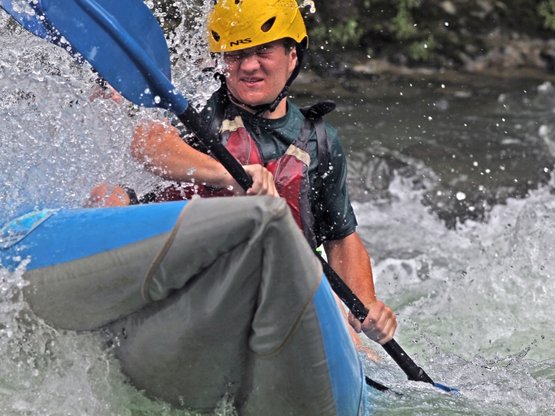Rafting difficulty levels

Rafting Activity
Rafting is a high adrenaline activity that involves cruising down a river in inflatable boats. It includes various levels of difficulty depending on the river's waviness.
Difficulty levels are determined by sudden jumps in the height of the river, the presence of rapids that mix with the water due to small or large rocks. Rafting is challenging but great fun, just remember to keep in mind the instructor's safety advice. White water (fast), professional guidance, proper training, using the appropriate equipment, taking all safety precautions, following a set of international safety and ecological norms triggers fear and only in this way the river flow is carried out properly. Rafting is an extremely safe, fun and exciting soft adventure sport.
The reason why the sport is so popular is probably because almost everyone can raft, even those who can't swim. Just by listening to the instructions for 15 minutes, you can start experiencing the craziest moments of your life. Ride the waves and enjoy nature. Don't forget that you can have a safe rafting trip in Antalya with us! Below is information about Rapid's flow rating system;
Rating system for Rapids Waterfall Stream;
Rapids are rated internationally on difficulty from I to VI, with the danger gradually increasing. The size and type of waves, river hazards, distance, water temperature and nature (continuous rapids or calm section between rapids), geographical area are all factors in determining the grade. The overall rating of a river depends on the roughest rating on that river. Below is a list of rafting difficulty grades and levels.
Rafting Difficulty Levels;
- Grade I: Small waves / Fast flowing water with waves
- Grade II: Easy
- Grade III: Difficult
- Grade IV: Very Difficult
- Grade V: Extreme, can only be done by experienced crew, is life-threatening and may cause leg injuries
- Class VI: Non-negotiable suicide :)
Good rafting experience is required for Classes IV and III, intermediate swimming skills are necessary for Classes I to III.
The Importance of Participating in Adventure Activities
1. You improve your physical health when you get dirty. Scientists have recently said that our modern obsession with cleanliness can lead to allergies, asthma and inflammatory bowel disease. Getting dirty can be the best way to develop a strong immune system. Going on adventures means getting dirty and being healthy.
2. Outdoor activities can prevent or treat a wide range of health problems. Adventure journeys and breathing nature's oxygen are among the prescriptions recommended by doctors across the country for many ailments, from heart diseases to obesity and attention deficit disorder.
3. Adventure has no age. Everyone can turn nature into a playground. Adventure tours journey is just one part of it, it is an activity you can do throughout your life. The important thing is that you can overcome the challenges, big and small that come your way.
4. Go for a walk, get a bigger brain. Research shows that walking or hiking trains the brain. Normally when you reach middle age, your hippocampus shrinks, leading to memory loss. But a group of middle-aged adults who walked 40 minutes at a time, three times a week for a year, found their hippocampus increased by an average of 2 percent; This may increase retention rates in future years. Hiking adventures keep you mentally sharp.
5. Going on an adventure increases tolerance for uncertainty. You can learn to cope with life's uncertainties if you expose yourself to situations that don't always go as planned, such as adventure travel.
Read More
6. Adventure travel allows you to safely try out alternative lives. The best part about starting an adventure is to pretend you're doing everything you want it to be before you take a big, permanent step. You can ask yourself the question, who would you be if you lived there?
7. Going on adventures often improves thinking, which is a mental ability. Adventures give us beautiful memories that bring our minds to the forefront to remember. This means that our journey was simply "marinated"; It's an especially valuable exercise these days, when so much of what we do seems to fly by and go on forever without any real meaning. But reliving our adventures over and over gives us the time and ability to learn from them.
8. Adventure travel nourishes dreams and builds confidence. The editor of National Geographic Traveler Magazine once suggested that the Travel Cycle goes like this: Dream, plan, go, share. However, no matter how many steps are taken there, there is one thing that is certain about going to the magnificent points of nature: it becomes addictive in a short time. One wilderness does not seem to be enough; Your soul quickly craves more. And you will find yourself changing every time you go. Adventures build confidence, and with each successive event you challenge yourself a little more. I will add a fifth step to the Travel Cycle: Dream bigger.
9. Adventure experiences cure social ills. Today, we are faced with a situation that some in Turkey describe as an epidemic. The adventurous childhood has been lost in the new generation. When parents spend too much time with their children and insist on attending their every activity, they kill the child's desire to explore. And unfortunately, they constantly extinguish the spark within them. No matter what, don't kill your child's spirit of adventure for the sake of being a better parent.
10. Adventure explorers may be more important than ever in saving the world; Some scientists say it will become impossible to reverse global warming, which will accelerate climate change. If they are right, only selected groups from the public can become adventure travelers.









